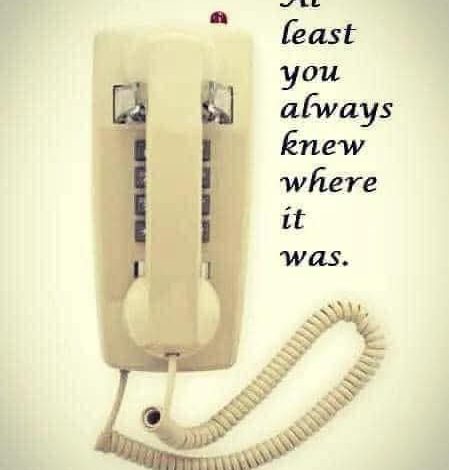
ADVERTISEMENT
The Nostalgia of Landline Telephones: A Fixed Connection to the Past
Introduction
Before the era of smartphones and wireless technology, the humble landline telephone was an essential fixture in every household. As depicted in the image above, the classic landline with its coiled cord and reliable presence evokes memories of a time when communication was simpler and more personal. Unlike today’s mobile devices that can be misplaced, landline telephones had a permanent place in the home—on the kitchen counter, mounted on a wall, or perched on a hallway table. This article delves into the charm and cultural significance of landline telephones and why they remain a cherished symbol of an era gone by.
The Evolution of the Landline Telephone
The invention of the telephone by Alexander Graham Bell in 1876 revolutionized the way people communicated. Early models were basic, requiring manual operation and a direct connection between callers. By the mid-20th century, the landline telephone had become a sophisticated device, with rotary dials, push-button keypads, and even built-in answering machines.
The design of the landline telephone underwent constant evolution. Models like the one in the image above, with their sleek plastic frames and coiled cords, were typical of the 1970s and 80s. These phones were built to last, offering crystal-clear sound quality and a level of reliability unmatched by modern wireless devices.
The Role of the Landline in Daily Life
Landline telephones were more than just communication tools; they were central to daily life and family interactions. Here’s how they shaped the way people lived:
- A Fixed Presence:
Unlike mobile phones that can be carried around, landlines had a designated spot in the home. Everyone in the household knew where to find the phone, and it became a shared resource for family members. - Quality Conversations:
Without the distractions of text messages, apps, or social media, phone calls on landlines were more focused and personal. Conversations were deliberate, often planned, and cherished. - Family and Community Connection:
Landlines were a lifeline for staying in touch with relatives, friends, and neighbors. They played a vital role in fostering a sense of community. - The Phone Ritual:
Answering the phone was often a family affair. Children raced to pick up calls, and parents monitored the time spent talking, especially for long-distance calls, which were billed per minute.
The Transition to Mobile Technology
With the advent of mobile phones in the 1990s and the rise of smartphones in the 2000s, the use of landline telephones began to decline. Wireless communication offered unparalleled convenience, allowing people to carry their phones wherever they went. However, this shift also brought a new set of challenges:
ADVERTISEMENT
- Lost Phones: Unlike landlines, mobile phones are frequently misplaced or forgotten.
- Overload of Features: Smartphones, while versatile, can be overwhelming with constant notifications and distractions.
- Loss of Shared Experiences: The communal aspect of landlines, where families shared one phone, has been replaced by the individual nature of smartphones.
Why Landlines Still Hold Nostalgia
Despite their decline, landline telephones continue to evoke a sense of nostalgia. For many, they represent a simpler time when communication was less hurried and more intentional. The tactile feel of dialing a number, the sound of the phone ringing, and the act of picking up the receiver all carry a sentimental value.
Additionally, landlines are still valued for their reliability. In emergencies, when mobile networks fail or batteries die, a landline can be a lifeline. Their durability and lack of reliance on charging make them a practical backup in many households.
Conclusion
The landline telephone, with its fixed presence and unmistakable design, remains a beloved icon of the past. It reminds us of an era when communication was about connecting deeply and meaningfully. While modern technology has made life more convenient, the simplicity and reliability of landlines are sorely missed by those who grew up with them.
As we move forward in an increasingly digital world, it’s important to reflect on the value of the tools that once connected us. The landline telephone, though largely replaced, continues to hold a special place in our collective memory as a symbol of stability, connection, and simpler times.
So, next time you think about your phone, take a moment to appreciate the landline—a faithful companion that always stayed where it belonged. 📞✨
ADVERTISEMENT




